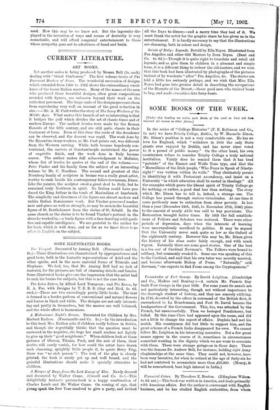SOME BOOKS OF THE WEEK.
[Tinder this heading we notice such Books of the week as hays not beat reserved for review in other forms.] In the series of " College Histories" (F. E. Robinson and Co., 5s. net) we have Trinity College, Dublin, by W. Macneile Dixon. Mr. Dixon's position is not a very comfortable one. He has no love for England, which " withdrew in 1858 the only State grants ever enjoyed by Dublin, and has never since voted to it a pound of public money." On the other hand, his own countrymen refuse to consider Trinity College a truly national institution. Vainly does he remind them that it has bred "patriots" of the Emmet and Wolfe Tone type, and that the " Marseillaise of the Irish people, 'Who Fears to Speak of Ninety- eight?' was written within its walls." They obstinately persist in identifying it with Protestant ascendency, and insist on a University "in which education shall be rooted in theology." All the examples which prove the liberal spirit of Trinity College go for nothing, or rather, a good deal less than nothing. The story which Mr. Dixon has to tell is, indeed, a strange one. The College has passed through curious vicissitudes. At one time it came perilously near to extinction from sheer poverty. In less than a year (December 24th, 1645, to November 27th, 1646) plate to the amount of nearly £150 was sold to buy provisions. The Restoration brought better times. By 1663 the full establish- ment of Fellows and Scholars was restored. There were other periods of depression, days when the interests of learning were unscrupulously sacrificed to politics. It may be argued that the University never sank quite so low as the Oxford of the eighteenth century. However this may be, Mr. Dixon gives the history of his alma mater fairly enough, and with much vigour. Naturally there are some good stories. One of the beat is a bon :not of Cardinal Newman's. The Fellows were bound to celibacy, but commonly evaded it. Some one was speaking of this to the Cardinal, and said that his own tutor was secretly married, and became afterwards Bishop of Ferns. "Naturally," said Newmani" one expects to find Ferns among the Cryptogamous."






































 Previous page
Previous page